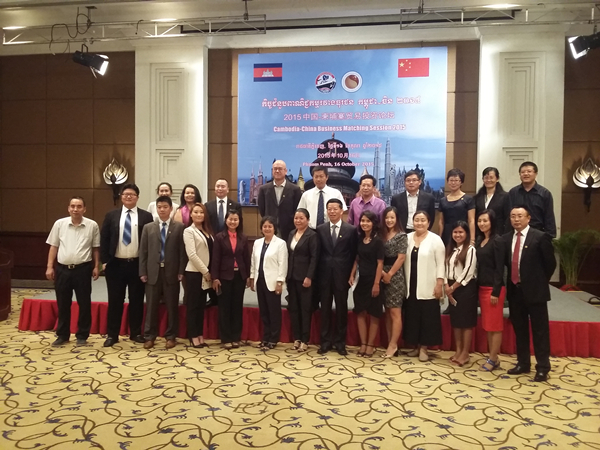
On 17 October 2015, the Cambodia-China Trade and Investment Cooperation Forum was held in Phnom Penh, Cambodia. This forum was jointly organized by ASEAN-China Center (ACC), Ministry of Commerce of Cambodia (MOC), Council for the Development of Cambodia (CDC), and Chamber of Commerce of Cambodia (CCC). At the Forum, Mr. Li Yuan, Director of the Trade and Investment Division (TID) of ACC, delivered an opening speech, and Mr. Chun Dala, Secretary of State of MOC, delivered a keynote speech. Lin Chujiang, Deputy Director of Development Bureau of CDC, introduced Cambodia's trade and investment policies and interacted with Chinese entrepreneurs.
Director Li Yuan expressed that the potential for bilateral economic cooperation and trade between China and Cambodia was huge. Driven by a joint effort of the leaders and entrepreneurs of both countries, bilateral economic and trade cooperation enjoyed a rapid development and achieved great success. As the bilateral trade was growing fast, China had become the largest foreign investor of Cambodia. From January to July 2015, the volume of bilateral trade had reached nearly 2 billion USD, with a year-on-year growth of 16%. Up to July 2015, China's direct investment to Cambodia had added up to approximately 3.6 billion USD. The amount of contract value for the projects in Cambodia had reached 11.35 billion USD, and had a turnover of 7.08 billion USD. At present, Chinese government had announced the "Vision and Proposed Actins Outlined on Jointly Building Silk Road Economic Belt and 21st Century Maritime Silk Road". It could be seen that both parties were working together to explore how to plan and coordinate to enhance the mechanism for bilateral economic and trade cooperation, to strengthen bilateral cooperation in jointly building the 21st Century Maritime Silk Road, economic and trade cooperation, to exploit the potential of bilateral trade cooperation, and to improve trade facilitation and convenience.
Mr. Chun Dala expressed congratulations on the Forum, believing that it would offer a fabulous opportunity for enterprises of both countries to cooperate and was of great importance for Chinese enterprises to invest in Cambodia. Up to now, Cambodia had signed trade and investment agreements with many foreign countries, meaning that the products made in Cambodia, when exported to the European countries, the United States, Japan and Korea would enjoy preferential duty and have no limitation in export quota. Whether it was investment company or trading company, they would be all allowed by Cambodia to hold 100% share, enjoy taxation reducing policy, with the highest profit taxes set as only 20%; Furthermore, Cambodia had no restriction of the outflow of profit on them. Cambodian government encouraged foreign investors to reinvest in Cambodia by eliminating profit taxes. Cambodian government promised that it would treat both domestic and foreign companies equally, give full play to market mechanism, without limiting commodity price. He also expressed his wish that Chinese enterprises and Cambodian local enterprises could cooperate to achieve mutual benefit and reciprocity.
Mr. Lin Chujiang introduced the main functions of CDC, laws and regulations related to investment in Cambodia, as well as the investment prospect in Cambodia. He said that Cambodia enjoyed open economy, stable macroeconomic regulations and control policies, preferential tax policy, competitive labor force, and favorable geographical location in the core of ASEAN countries, hence the potential for both countries to cooperate in agriculture and tourism was huge. On 15 October 2015, when Cambodian Prime Minister Hun Sen met Chinese President Xi Jinping in Beijing, both parties signed a contract regarding a purchase of 100,000 tons of Cambodia's rice. From 2007 to 2015, the number of Chinese tourists traveling to Cambodia had been growing. Cambodia received 700,000 Chinese tourists every year. At present, China was the second largest country that had tourists arrivals in Cambodia.
There were about 80 Chinese entrepreneurs and Cambodian entrepreneurs, who were from such fields as railway, highway, water and electricity, equipment, trade, real estate, technology, investment, etc., participated in the Forum. After the opening ceremony of the Forum, entrepreneurs of both countries discussed trade and investment cooperation. Director Li Yuan gave a detailed description about Investment Guide of China-ASEAN Trade edited by ACC, and had an indepth discussion with the representatives presented at the Forum regarding trade and investment which entrepreneurs had shown strong interests.
Trade and investment delegation organized by ACC also paid a visit to the Commercial Counsellor's office of Chinese embassy in Cambodia. Counselor Song Jianguo and commercial secretary introduced to the delegation about Cambodia’s investment and trade policies and the experience and lessons of investing in Cambodia, and had a discussion with the delegation on issues that enterprises were interested in